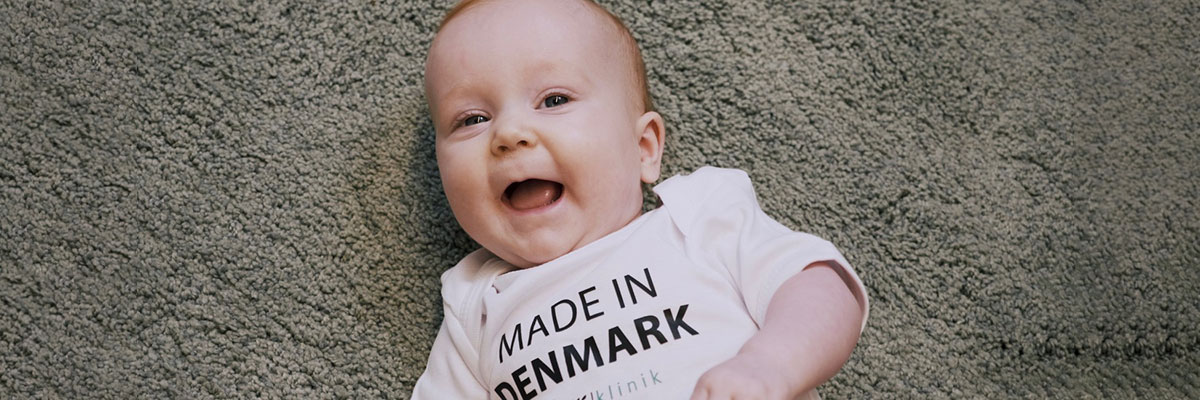
High succes rate for IUI = Good chances of pregnancy
Diers Klinik boasts a high success rate for IUI (intrauterine insemination).
Our experienced team are constantly committed to giving our customers the best possible chance of achieving pregnancy.
We understand that age plays a crucial role in fertility. Especially the woman’s age affects the chances of pregnancy. How exactly this shows, you can see in the success rates for IUI further down this page. So, we take all necessary steps to ensure optimal conditions for a successful outcome.
We are specialised in IUI treatment, and we take pride in offering it in your natural cycle.
Since opening in 2006, we have continually refined our natural IUI treatment method.
Today, we are the fertility clinic in Denmark with the highest number of IUI treatments per year. Our success rates speak for themselves, as we are one of the top clinics in Denmark.
Timing and good sperm quality is key for a high succes rate for IUI
We put a lot of effort into finding the perfect time for IUI insemination to give you the best chances of getting pregnant. Our considerable expertise in this area is why the clinic operates seven days a week, 365 days a year. This enables us to precisely synchronize the treatment with your natural cycle for optimal results.
Furthermore, we always do an ultrasound scan before insemination, to make sure everything is perfect and ideal for the treatment to be successful.
If we think the timing is not optimal, we’ll always let you know and discuss it with you, so you can decide if you want to go ahead with the treatment on the day or not.
We also check the sperm quality beforehand to make sure it’s of high quality before we do the insemination treatment. That means we won’t use a donor sperm sample, that doesn’t meet our expectations, for treatment.
If the IUI treatment is done with partner sperm, we also make sure that the quality is good enough for the insemination after purification. If we think that the quality is not good enough, we’ll recommend you refrain from treatment.
Discover our top recommendations on what you can do to enhance your chances of pregnancy when having insemination treatment.
Success rates for IUI with donor sperm in 2021-2023
We keep track of all the IUI insemination treatments we do, so we can give you the best advice and optimize our IUI treatment outcomes.
Below you can see our statistics for insemination treatments (IUI) here at the clinic in 2021, 2022 and 2023. The success rates for IUI are divided by age.
| Insemination (IUI) with donor sperm | -35 years | 36-39 years | 40-42 years | 43+ years | Total |
|---|---|---|---|---|---|
| Insemination (IUI) with donor sperm (N) | 581 | 303 | 179 | 87 | 1150 |
| Positive pregnancy test per insemination (N) | 180 | 59 | 28 | 6 | 273 |
| Positive pregnancy test per insemination (%) | 31% | 19,5% | 15,6% | 6,9% | 23,7% |
| Ongoing clinical pregnancy in week 8 (N) | 133 | 36 | 11 | 2 | 182 |
| Ongoing clinical pregnancy in week 8 (%) | 22,9% | 11,9% | 6,1% | 2,3% | 15,8% |
| Insemination (IUI) with donor sperm | -35 years | 36-39 years | 40-42 years | 43+ years | Total |
|---|---|---|---|---|---|
| Insemination (IUI) with donor sperm (N) | 708 | 319 | 148 | 105 | 1280 |
| Positive pregnancy test per insemination (N) | 180 | 68 | 27 | 4 | 279 |
| Positive pregnancy test per insemination (%) | 25,4% | 21,3% | 18,2% | 3,8% | 21,8% |
| Ongoing clinical pregnancy in week 8 (N) | 129 | 47 | 13 | 3 | 192 |
| Ongoing clinical pregnancy in week 8 (%) | 18,2% | 14,7% | 8,8% | 2,9% | 15,0% |
| Insemination (IUI) with donor sperm | -35 years | 36-39 years | 40-42 years | 43+ years | Total |
|---|---|---|---|---|---|
| Insemination (IUI) with donor sperm (N) | 637 | 330 | 182 | 80 | 1229 |
| Positive pregnancy test per insemination (N) | 164 | 68 | 19 | 6 | 257 |
| Positive pregnancy test per insemination (%) | 25,7% | 20,6% | 10,4% | 7,5% | 20,9% |
| Ongoing clinical pregnancy in week 8 (N) | 125 | 43 | 9 | 2 | 179 |
| Ongoing clinical pregnancy in week 8 (%) | 19,6% | 13,0% | 4,9% | 2,5% | 14,6% |